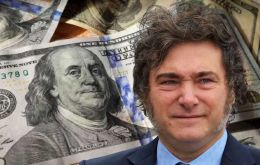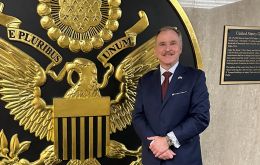MercoPress. South Atlantic News Agency
Economy
-
Monday, October 20th 2025 - 10:01 UTC
Global public debt nearing historic high, IMF finds

The International Monetary Fund (IMF) Fiscal Monitor report warned that global public debt was nearing a historic high, projected to exceed 100% of Gross Domestic Product (GDP) by 2029. In Latin America, the report identified Brazil, Argentina, and Uruguay as the countries with the highest levels of debt.
-
Monday, October 20th 2025 - 09:56 UTC
Retail sales plunge in Argentina even for Mother's Day gifts

Waning retail sales in Argentina, even in the wake of Sunday's Mother's Day celebrations, reflected the country's ongoing crisis just one week before the Oct. 26 midterms, according to a survey conducted by the Argentine Confederation of Medium-Sized Enterprises (CAME).
-
Saturday, October 18th 2025 - 10:29 UTC
Argentine markets remained unconvinced despite US help

Despite interventions from the United States Treasury, financial tensions continue to escalate in Argentina just over a week before the Oct. 26 midterms. The wholesale dollar recorded its biggest daily rise on Friday in almost six weeks, closing at AR$1,450, a 3.5% increase. It briefly reached an intraday high of AR$1,475, putting it just 2.5% below the floating band ceiling of AR$1,489.10.
-
Saturday, October 18th 2025 - 03:28 UTC
Bolivia concludes its first gold futures sale

Bolivia's Central Bank (BCB) successfully concluded its first gold futures sale, a transaction executed under a controversial legal framework aimed at bolstering the country's international reserves and foreign currency liquidity. The sale of 3 tons of gold generated a total of US$388.8 million for the BCB.
-
Friday, October 17th 2025 - 20:13 UTC
US-Argentina relationship: Ambassadors make optimistic remarks

Washington's Ambassador to Buenos Aires, Peter Lamelas, announced “big news” was on its way, probably regarding a strengthened economic alliance and a trade agreement. His statements were backed by similar comments from Argentina's mission chief in the United States, Alec Oxenford.
-
Friday, October 17th 2025 - 01:34 UTC
Argentina's pension system among the worst

According to the 2025 Mercer CFA Institute Global Pension Index, Argentina's pension system ranked 51st out of 52 countries surveyed, while those of Chile and Uruguay stood out in the region. The Netherlands topped the list globally with a score of 85.4 (A rating).
-
Thursday, October 16th 2025 - 20:10 UTC
Haddad insists on taxing super rich to fight social inequality

Brazil's Finance Minister Fernando Haddad reinforced his stance regarding global taxation of the super-rich to finance the fight against the climate crisis and to fight social inequality. He outlined his position in a letter at the 2025 annual meeting of the International Monetary Fund (IMF) and the World Bank in Washington, DC.
-
Thursday, October 16th 2025 - 09:33 UTC
Bessent steps in to keep dollar from soaring in Argentina

Argentina's financial markets bounced back on Wednesday following an intervention and new statements from US Secretary of the Treasury Scott Bessent after initial fearful trading resulting from US President Donald Trump's conditional endorsement of the South American country.
-
Wednesday, October 15th 2025 - 10:55 UTC
Trump sends stern warning about future US economic aid to Argentina

US President Donald Trump said on Tuesday that his country's help to Argentina hinged on Javier Milei's La Libertad Avanza (LLA) winning the upcoming midterms, followed by reelection in 2027. Trump stressed that the upcoming elections were “very important” and “being watched by the world.”
-
Wednesday, October 15th 2025 - 10:41 UTC
Paraguayan e-commerce becomes a consolidated business

According to the Paraguayan Chamber of Electronic Commerce (Capace), the activity in the South American country is going through its best year with a projected growth of 75% compared to 2024, thanks to the digitalization of small businesses and increasing consumer confidence.
